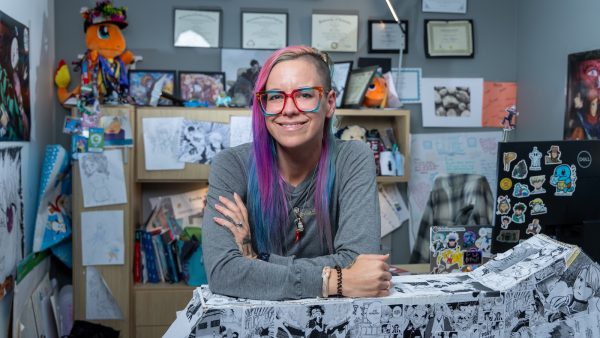
Emilie Waggoner, director of student transitions at the University of Colorado Denver (CU Denver), is reshaping the educational experience for first-generation college students through her innovative course, “Anime Goes to College.” This seminar not only teaches students about the themes of identity and belonging but also encourages them to embrace their authentic selves in academic settings. Waggoner, known for her distinctive rainbow glasses and vibrant hair colors, integrates elements of popular anime, such as *Jujutsu Kaisen*, to facilitate personal growth and reflection among her students.
Waggoner emphasizes the importance of creating a supportive environment, particularly for those facing the challenges of transitioning to higher education. “When you are making any kind of big transition, it can be scary,” she noted. “Anime tends to have magical world elements that show exactly that. How do you figure out your place in a new world? That’s what a lot of our students are doing.”
Supporting First-Generation Students
The course is a vital component of CU Denver’s Lynx Summer Academy, designed to assist first-generation students before their first semester. Waggoner’s approach encourages students to share their whole selves in the classroom. She believes that seeing characters in anime navigate similar struggles can inspire students to reframe their own challenges. “Anime tells them, you’re going to find your people, and you’re going to grow, even if it’s hard,” she explained.
Waggoner’s curriculum promotes self-reflection and personal development, helping students visualize their future selves. Her unique teaching style has garnered significant interest, leading to the course being offered during the academic year as well.
Academic Rigor Meets Pop Culture
Beyond her role as an instructor, Waggoner is also a dedicated scholar. Currently pursuing a Doctor of Education at CU Denver, she holds two master’s degrees and focuses her research on anime fandom, identity development, and student transitions. In the summer of 2025, she will serve as the keynote speaker at the JAMS@AX Academic Symposium at the Anime Expo in Los Angeles, which attracts over 100,000 attendees annually.
Waggoner’s message resonates particularly with first-generation students who may feel pressured to conform to traditional academic norms. “You can be a serious scholar and still love anime. You can have pink hair and still publish academic research,” she stated. Her course design incorporates analytical thinking and peer-reviewed research, challenging students to connect their personal interests with academic inquiry.
Waggoner shared the impact this approach has on students, stating, “When they read peer-reviewed research on anime, it blows their minds. They see themselves reflected in scholarship for the first time. That’s where confidence blooms.” Feedback from students confirms the effectiveness of her methods, with one remarking, “I feel smarter every time I leave this class.”
Anime serves as a vehicle for exploring significant life questions in the classroom. Waggoner encourages students to engage with themes such as purpose and resilience, mirroring the inquiries they face as they enter college. “What’s my purpose? How do I handle failure? Who do I want to be? These are the same questions students ask when they come to college,” she noted.
By the semester’s end, students gain not only academic knowledge but also a deeper understanding of themselves and their peers. Waggoner aims to equip them with the language to articulate their experiences and navigate challenges. “When they hit something difficult, like a bad grade or a team conflict, they’ll think back to these stories and theories and say, ‘OK, I know how to move through this,’” she explained.
Through her dynamic approach, Waggoner not only fosters a sense of belonging but also empowers students to embrace their identities, setting a precedent for inclusive education in higher learning.







